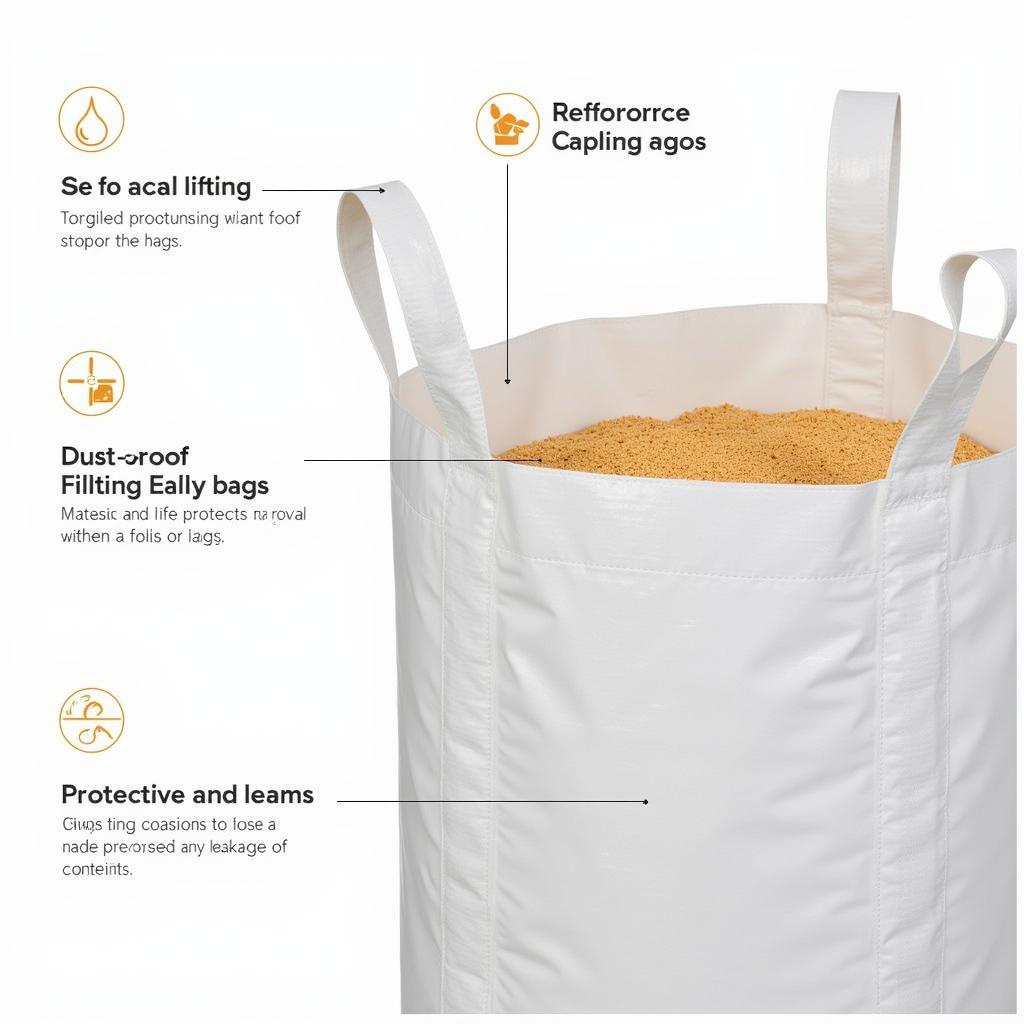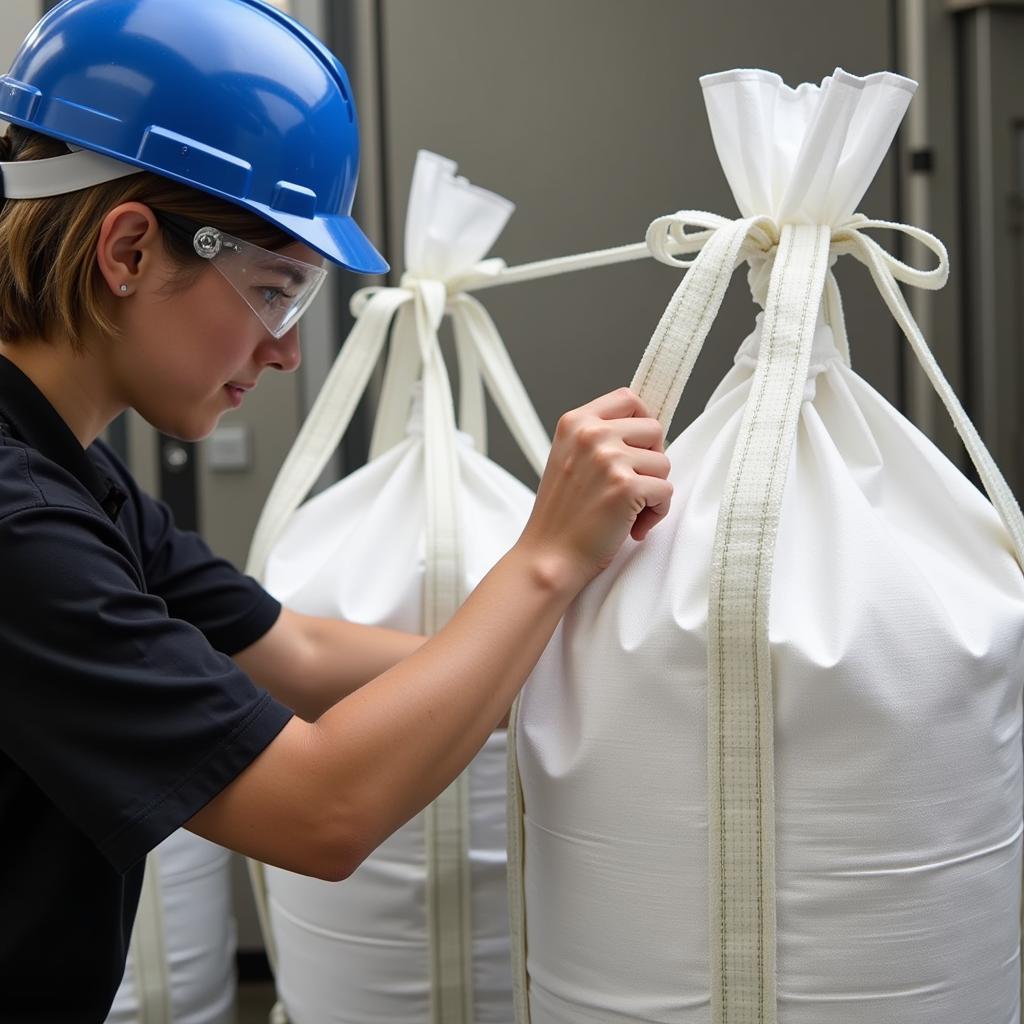Food Grade Bulk Bags are essential for businesses that handle large quantities of ingredients or finished products. These specialized bags, also known as FIBCs (flexible intermediate bulk containers), are designed to safely and efficiently transport and store everything from flour and sugar to pet food and pharmaceuticals. Choosing the right food grade bulk bag is crucial for maintaining product quality and ensuring compliance with safety regulations. Let’s delve into the world of food grade bulk bags and discover how they can benefit your business.
Understanding Food Grade Bulk Bags
Food grade bulk bags are more than just large containers. They are specifically engineered to meet stringent hygiene and safety standards. These bags are made from woven polypropylene fabric that is treated to prevent contamination and maintain the integrity of the stored product. Unlike standard bulk bags, food grade versions undergo rigorous testing to ensure they are free from harmful chemicals and meet FDA regulations. This guarantees the safety and quality of your food products throughout the supply chain. Choosing food grade FIBCs is an investment in the quality and safety of your products. food grade fibc will ensure you’re meeting the necessary standards.
Key Features of High-Quality Food Grade Bulk Bags
Not all food grade bulk bags are created equal. Look for these essential features to ensure you’re getting the best quality:
- Virgin polypropylene resin: This ensures the bag is free from contaminants and provides optimal strength and durability.
- UV stabilization: Protects against degradation from sunlight, especially important for outdoor storage.
- Dust-proof seams: Prevents product leakage and contamination.
- Reinforced loops: Provides secure lifting and handling.
- Liner options: Choose from various liner options, such as polyethylene or polypropylene, to further protect against moisture and contamination. Using heat sealable food bags within your bulk bags can add an extra layer of protection.
 Close-up view of a food grade bulk bag, highlighting its key features such as reinforced loops, dust-proof seams, and a protective liner.
Close-up view of a food grade bulk bag, highlighting its key features such as reinforced loops, dust-proof seams, and a protective liner.
Why Choose Food Grade Bulk Bags?
Food grade bulk bags offer several advantages over traditional storage methods. They are cost-effective, space-saving, and highly versatile. From grains and powders to frozen fruits and vegetables, these bags can accommodate a wide range of products. Their durability and resistance to tearing and punctures make them ideal for demanding environments. Are you considering long-term food storage? Perhaps understanding how to use mylar bags for food storage could be beneficial alongside bulk bags.
Benefits of Using Food Grade Bulk Bags:
- Cost-effective storage: Reduces packaging and transportation costs.
- Space-saving design: Optimizes warehouse space and storage efficiency.
- Enhanced product protection: Safeguards against contamination and moisture.
- Easy handling and transportation: Simplifies logistics and improves efficiency.
- Sustainable solution: Many food grade bulk bags are reusable or recyclable.
Choosing the Right Food Grade Bulk Bag
Selecting the appropriate food grade bulk bag involves considering several factors, including the type of product being stored, its weight, and the storage environment. It’s crucial to choose a bag that meets the specific requirements of your product and ensures its safety and quality. If you’re looking for a way to package smaller portions, you might find information on large vacuum seal bags for food helpful.
Factors to Consider When Choosing Food Grade Bulk Bags
- Safe Working Load (SWL): Ensure the bag can safely hold the weight of your product.
- Size and dimensions: Choose the right size to maximize storage space and efficiency.
- Liner requirements: Consider whether your product requires a liner for added protection.
- Bag construction: Look for features like reinforced seams and loops for added durability.
- UV protection: If storing outdoors, choose a bag with UV stabilization.
“When choosing food grade bulk bags, it’s essential to consider the specific properties of your product,” says Maria Sanchez, a Food Safety Consultant. “For example, hygroscopic products might require a moisture-barrier liner, while products susceptible to oxidation may benefit from a bag with oxygen-barrier properties.”
 A quality control inspector examining a food grade bulk bag for defects.
A quality control inspector examining a food grade bulk bag for defects.
Conclusion
Food grade bulk bags are a crucial component of a safe and efficient food supply chain. By understanding the different types of bags available and choosing the right one for your specific needs, you can protect your product, optimize your storage space, and ensure compliance with safety regulations. Investing in high-quality food grade bulk bags ultimately protects your brand reputation and contributes to the delivery of safe and high-quality food products to consumers. Remember to carefully consider all factors before making a decision, and prioritize quality and safety above all else. Choosing the right polypropylene food container is also a key consideration for your business.
FAQs
- What is the difference between a standard bulk bag and a food grade bulk bag?
- Are food grade bulk bags reusable?
- How do I choose the right SWL for my food grade bulk bag?
- What are the different types of liners available for food grade bulk bags?
- How can I ensure the quality of my food grade bulk bags?
- Where can I purchase certified food grade bulk bags?
- What are the proper storage and handling procedures for food grade bulk bags?
Common Scenarios
- Scenario 1: Storing large quantities of flour for a bakery. A food-grade bulk bag with a dust-proof liner would be ideal.
- Scenario 2: Transporting frozen fruits. A food-grade bulk bag with a moisture-resistant liner and UV protection would be necessary.
- Scenario 3: Storing pet food. A food-grade bulk bag with a pest-resistant liner might be considered.
Further Reading
For more information on food storage solutions, check out our articles on vacuum sealing and mylar bags.
For any assistance, please contact us at Phone Number: 02437655121, Email: minacones@gmail.com Or visit us at: 3PGH+8R9, ĐT70A, thôn Trung, Bắc Từ Liêm, Hà Nội, Việt Nam. We have a 24/7 customer service team.